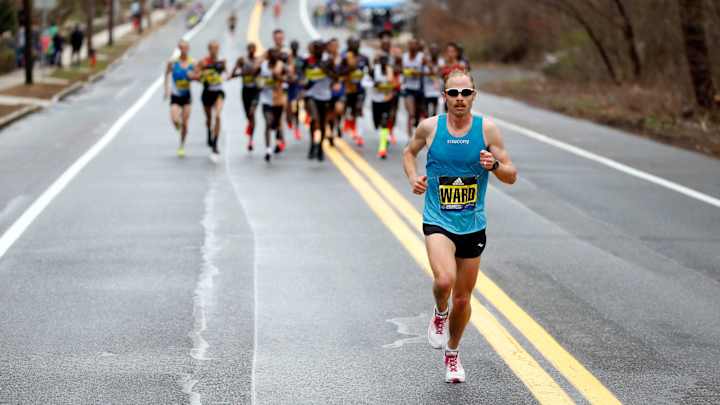Previewing the 2020 U.S. Olympic Marathon Trials

Pop into any bar in downtown Atlanta this weekend and you’ll likely come across runners debating and asking each other, “Who is your top three?” It’s a discussion that’s taken place among running junkies for years in anticipation of the U.S. Olympic marathon trials.
On Saturday, more than 700 runners will compete for just six spots on the U.S. team for the 2020 Olympics in Tokyo.
World Athletics, track and field’s global governing body, has granted the trials a “gold label” status due to the premier caliber of talent in the race. This means that the top three finishers in the men’s and women’s races will be eligible to compete at the Olympics whether or not they have hit the respective Olympic qualifying times (2:11:30 for the men and 2:29:30 for the women).
At the 2016 trials in Los Angeles, Team USA was represented in the marathon by Galen Rupp, Meb Keflezighi and Jared Ward on the men’s side, while Amy Cragg, Desiree Linden and Shalane Flanagan took the top three spots for Rio on the women’s side. The Los Angeles heat served as a good test run for Rio, as the men came away with two top 10 finishes and a bronze medal at the Olympics, and the women posted the best team showing of all countries, with all three finishers in the top 10. This year’s race is much deeper on both sides. The sport’s recent shoe technology controversy could also have an impact, as World Athletics deemed Nike’s Vaporfly shoes legal and eligible for use in competitions like the trials.
Here’s a look at the top competitors based on their race pedigree and recent results.
MEN
The favorite: Galen Rupp, 2:06:07 personal best
Rupp is the reigning Olympic marathon trials champion and went on to win bronze at the Summer Games in Rio de Janeiro. In the last four years, Rupp has taken perfectly to the marathon after a successful career on the track that included 10 national titles and an Olympic silver medal in the 10,000 meters in 2012. In April ’17, he finished second in 2:09:58 at the Boston Marathon and then won the Chicago Marathon in 2:09:20 in October. He was forced to drop out of the 2018 Boston Marathon due to hypothermia symptoms in brutally cold conditions but recycled his fitness to run 2:06:07 at the Prague Marathon. He is now the second-fastest U.S. marathoner in history behind Khalid Khannouchi’s record of 2:05:38 from the 2002 London Marathon. At 33 years old, Rupp is in the prime of his marathoning career.
Last year was the toughest year of Rupp’s career. In October 2018, Rupp underwent surgery on his left heel to address the Haglund's deformity bump on his Achilles. A year later, he returned to run the Chicago Marathon but dropped out near the 23-mile mark due to a calf strain. He appears to be back to full health after winning a half-marathon in 61 minutes and 19 seconds earlier this month.
In October, Rupp also needed to make major changes to his training after his longtime coach, Alberto Salazar, was banned by the United States Anti-Doping Agency for four years due to doping violations. The news came 12 days before Rupp was slated to run the Chicago Marathon; Salazar is currently appealing the suspension. Rupp has never tested positive for performance enhancing drugs and stood by his coach when addressing reporters in Chicago. Rupp is now coached by Northern Arizona track and field coach Mike Smith. Rupp has shown that even when he’s not in his best shape, he is still better than most of the U.S. marathoning scene.
Strong contenders
Jared Ward, 2:09:25 personal best
Beyond being one of the country’s top marathoners, Ward is also a professor at BYU and he wrote his master’s degree thesis on optimal marathon pacing. At the 2016 trials, Ward used his smarts to snag the third Olympic team spot. He was briefly hurt in 2017 but has been one of the most consistent American marathoners since ’18. Ward was the top American at the 2018 New York City Marathon and then joined the sub-2:10 club in Boston the following spring. He was named Track and Field News’ No. 1 American marathoner of 2019. His 61:31 personal best in the half-marathon, which was set in January, is a positive sign that he is trending upward.
Scott Fauble, 2:09:09 personal best
Fauble led the charge in 2019 to silence critics of American distance running for saying times were getting slower since no one was breaking 2:10. Fauble dropped his personal best from 2:12:28 to 2:09:09 with his seventh-place showing (top U.S. finish) in Boston. Fauble is looking to make his first U.S. Olympic team. In 2016, he was fourth in the 10,000 meters at the 2016 U.S. Olympic Track and Field Trials. He turned professional and has been training with the Hoka One One Northern Arizona Elite training group out of Flagstaff, Ariz., posting his workouts on Strava to the delight of many running enthusiasts.
The wild card: Leonard Korir, 2:07:56 personal best
A 2016 U.S. Olympian at 10,000 meters, Korir surprised many by running 2:07:56 for the fastest U.S. marathon debut and the fifth-fastest time in American history. He owns the fastest half-marathon personal best in the field with a 59:52 half marathon from the 2017 Delhi Half Marathon in India. With just one marathon under his belt, it will be interesting to see how his fast time will translate to a hilly course like Atlanta.
Other notables:
Bernard Lagat (2:12:10 personal best) – The five-time Olympian is looking to make his sixth Summer Games at age 45.
Luke Puskedra (2:10:24 personal best) – He missed the Olympics in 2016 by just 16 seconds and retired last year at 29 years old. But Puskedra’s retirement was short-lived, as he returned to training for the trials while balancing a job in real estate.
Dathan Ritzenhein (2:07:47 personal best) – The three-time U.S. Olympian has battled many injuries throughout his career. After dropping out of the trials in 2016, he’ll take one more shot at making the Olympic team on Saturday.
Shadrack Biwott (2:12:08 personal best) – Biwott was seventh at the trials in 2016 and has put together solid showings with top five finishes at the 2016 New York City Marathon, 2017 Boston Marathon and 2018 Boston Marathon.
Jim Walmsley (marathon debut) – America’s best ultramarathoner is dropping down in distance to make his marathon debut.
Brogan Austin (2:12:39 personal best) – Austin won the California International Marathon and was the USATF Marathon champion in 2018.
WOMEN
The favorite
This race is going to be so close that no clear favorite can be determined.
Strong contenders
Jordan Hasay, 2:20:57 personal best
Hasay sits atop the entries with the fastest personal best and the second-fastest time in American history. On the World Marathon Majors scene, she has three podium finishes in the three marathons that she has finished. Last fall, she dropped out of the Chicago Marathon after 5K due to a hamstring injury, and she was also forced to look for a new coach after Salazar’s ban. In 2019, Hasay announced that former marathon world record holder Paula Radcliffe will be her “coaching adviser,” and she moved back to her hometown of Arroyo Grande, Calif., for training. Heralded as a star as a high schooler competing at the 2008 U.S. Olympic track and field trials, Hasay is aiming to make her first-ever U.S. Olympic team in Atlanta.
Emily Sisson, 2:23:08 personal best
With just one marathon in her career, Sisson could be the favorite given the brilliance of her 2019 campaign. She set personal bests in the 5,000 meters (15:10.62), 10,000 meters (30:49.57), half-marathon (67:30) and marathon. The 2016 Olympian also finished 10th in the 10,000 meters at the IAAF World Championships in Doha in late September, and she’s been dangerous on the roads.
Molly Huddle, 2:26:33 personal best
Huddle owns 25 national titles, and many of them come from the roads. She’s still seeking that one big marathon moment, but she’s been impressive in three of the four that she has run. (You can’t fault her for a 2:50:28 in the awful 2018 Boston Marathon storm.) Huddle finished third at the 2016 New York City Marathon, fourth at the 2018 New York City Marathon and 12th at the 2019 London Marathon, with a personal best time. When Huddle is on, she’s unstoppable against other U.S. women. It would be interesting to see whether she works together with Sisson, her training partner, to push the pace or lead the pack.
Sara Hall, 2:22:16 personal best
Hall has been running the marathon since 2015 but had a strong showing in ’19 when she went from 2:26:20 to 2:22:16 at the Berlin Marathon in September. Last year, she raced very often and set personal bests in the 10 mile, 8K, 7 mile, 20K, 25K and marathon distances. In an audacious double attempt, Hall attempted to run the New York City Marathon just 35 days after Berlin, but dropped out of the race due to a stomach illness.
Des Linden, 2:22:38 personal best
Linden is the only remaining member of the 2016 U.S. Olympic Marathon team and the only woman in the field who has won a major marathon. She overcame the cold, rainy and windy conditions to make history as the first U.S. woman to win the Boston Marathon since 1985. Linden was always one of the top U.S. women in marathons, and even once the hype and attention after Boston subsided, that remained true. She was the third American in New York in ’18, second American (5th overall) in Boston in ’19 and top American woman in New York in ’19. If Linden can match any of those performances, she’ll become a three-time Olympian. At age 36 with 13 years of marathon running under her belt, Linden could be racing in her final U.S. Olympic Trials on Saturday, before a possible transition to the roads next year.
Emma Bates, 2:25:27 personal best
Bates was an excellent cross-country runner at Boise State and has fared well in her two marathons. She won the USATF Marathon Title at the California International Marathon in December 2018 in 2:28:19 before cutting nearly three minutes off with her 2:25:27 for fourth place at the Chicago Marathon last October. The course could work in her favor.
Kellyn Taylor, 2:24:29 personal best
Taylor has one of the best stories coming into the trials as a mother, foster mother and firefighter in training. She was sixth at the trials just four years ago, but has since lowered her personal best to 2:24:29 at the 2018 Grandma’s Marathon in Duluth, Minn. Much like Bates, she is a total grinder who competes well on championship-esque courses where fast times are secondary to placing well. Most recently, she ran 69:13 on a half marathon course in Tempe, Ariz., that was accidentally measured about 200 meters short, but the fitness is there.
Other notables:
Sally Kipyego (2:25:10 personal best) – The 2012 Olympic silver medalist in the 10,000 meters will be competing in her first U.S. Olympic Trials since becoming a U.S. citizen in 2017. She gave birth to her daughter in the summer of 2017 and then struggled with malaria and pneumonia while training in Kenya. Her only marathon finish since was a 2:25:10 personal best in Berlin last fall.
Stephanie Bruce (2:27:47 personal best) – Lowered her personal best to 2:27:47 at last year’s Chicago Marathon. She was last year’s half-marathon national champion.
Roberta Groner – Finished sixth at last year’s world championships marathon in Doha at 42 years old.
The prediction
As of Monday morning, here are my predictions*:
Men’s team: Galen Rupp, Leonard Korir, Jared Ward
Women’s team: Emily Sisson, Molly Huddle, Jordan Hasay
*Subject to change up until a minute before the race, because there’s that much chaos ready to unfold
